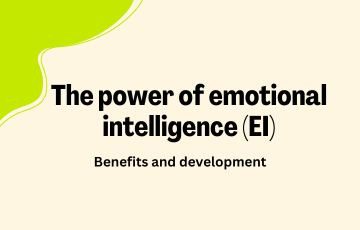
Emotional intelligence (EI) is the ability to recognize, understand, and manage our own emotions, as well as the emotions of others.
It encompasses skills like empathy, self-awareness, self-regulation, and social skills. While traditional intelligence (IQ) focuses on cognitive abilities, EI plays a crucial role in personal and professional success.
One of the key benefits of emotional intelligence is enhanced interpersonal relationships. People with high EI can navigate social situations effectively, communicate clearly, and resolve conflicts peacefully.
They are empathetic listeners who understand the perspectives of others, fostering trust and cooperation.
Emotional intelligence also contributes to effective leadership. Leaders who possess EI inspire and motivate their teams, create a positive work environment, and adapt to change with resilience.
They excel in decision-making by considering both rational analysis and emotional implications.
Moreover, individuals with high EI tend to have better mental health outcomes. They can manage stress, cope with setbacks, and maintain a positive outlook on life. This resilience leads to greater overall well-being and satisfaction.
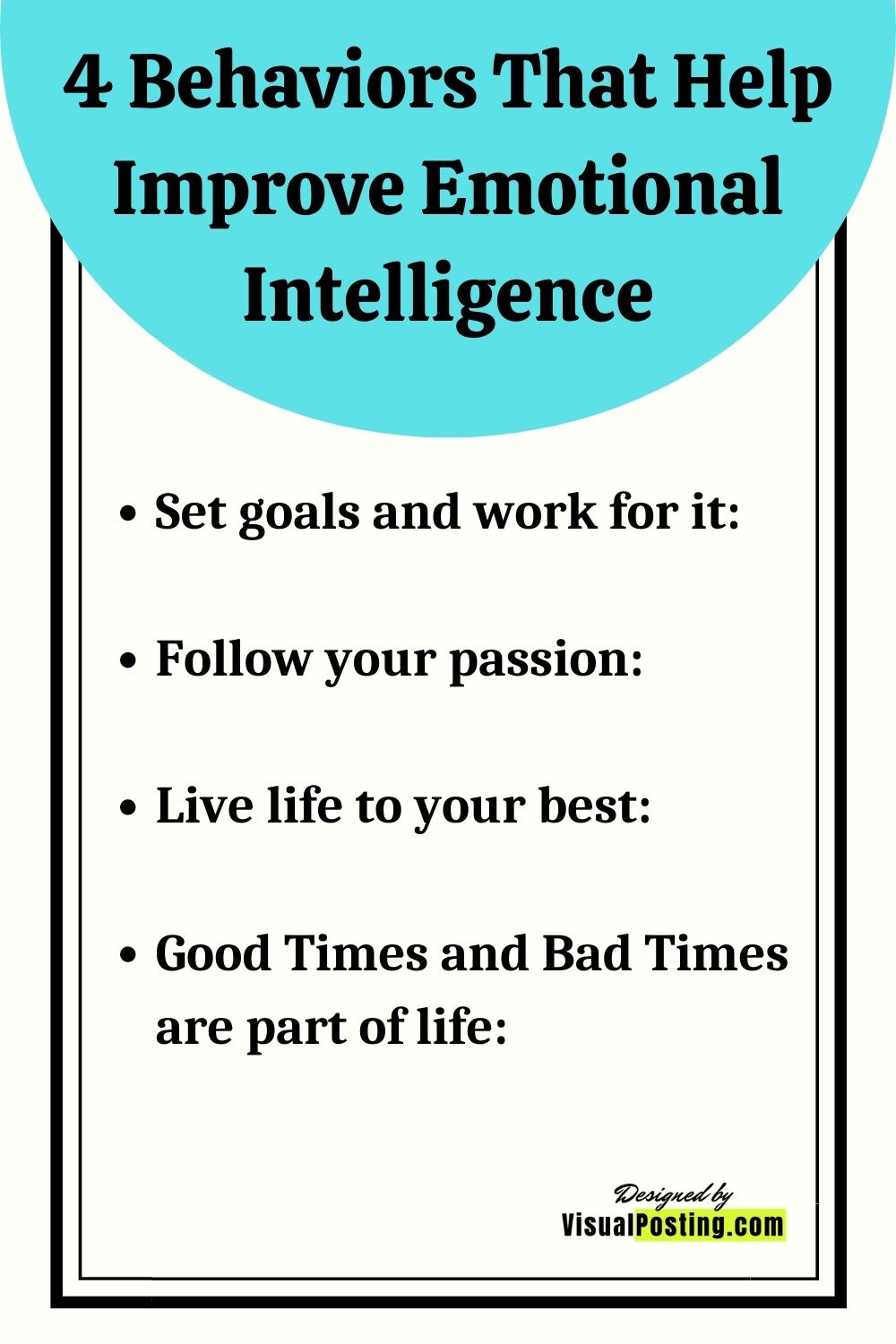
Developing Emotional intelligence helps you handle life situations in a better way. It applies to each walk of your life, including your education, work, personal, business, and socializing. Emotional intelligence is impactful. It makes you a better person every day. It helps you build good relations, emotional stability, and confidence that eventually solve almost all your problems. I have shed some light on emotional intelligence.
1. Set goals and work for them:
Write your goals. Even if it is a short term goal, write it down. Have a vision board and stick things that you like to achieve. It gives motivation to you. Setting goals and working for them is also a form of emotional intelligence.
2. Follow your passion:
Following your passion can bring positive outcomes to you emotionally and mentally. Your passion brings happiness and self-contentment.
3. Live life to your best:
Live life to your fullest with friends and loved ones. Life is a balance of positives and negatives. Do not worry when things are not going your way. Time heals everything. Time changes everything. Life is filled with blessings. Look around. Live it to the fullest.
4. Good Times and Bad Times are part of life:
This point is a key step towards improving your emotional intelligence. Good and bad are part of life. This stability and understanding are essential to take your life in a balanced way.
In practice, time and experience will shape your emotional intelligence. Over time you will learn life lessons, which in turn build a great level of emotional intelligence. Emotional intelligence takes time so give it. Meanwhile, start implementing little changes that can improve your emotional intelligence.
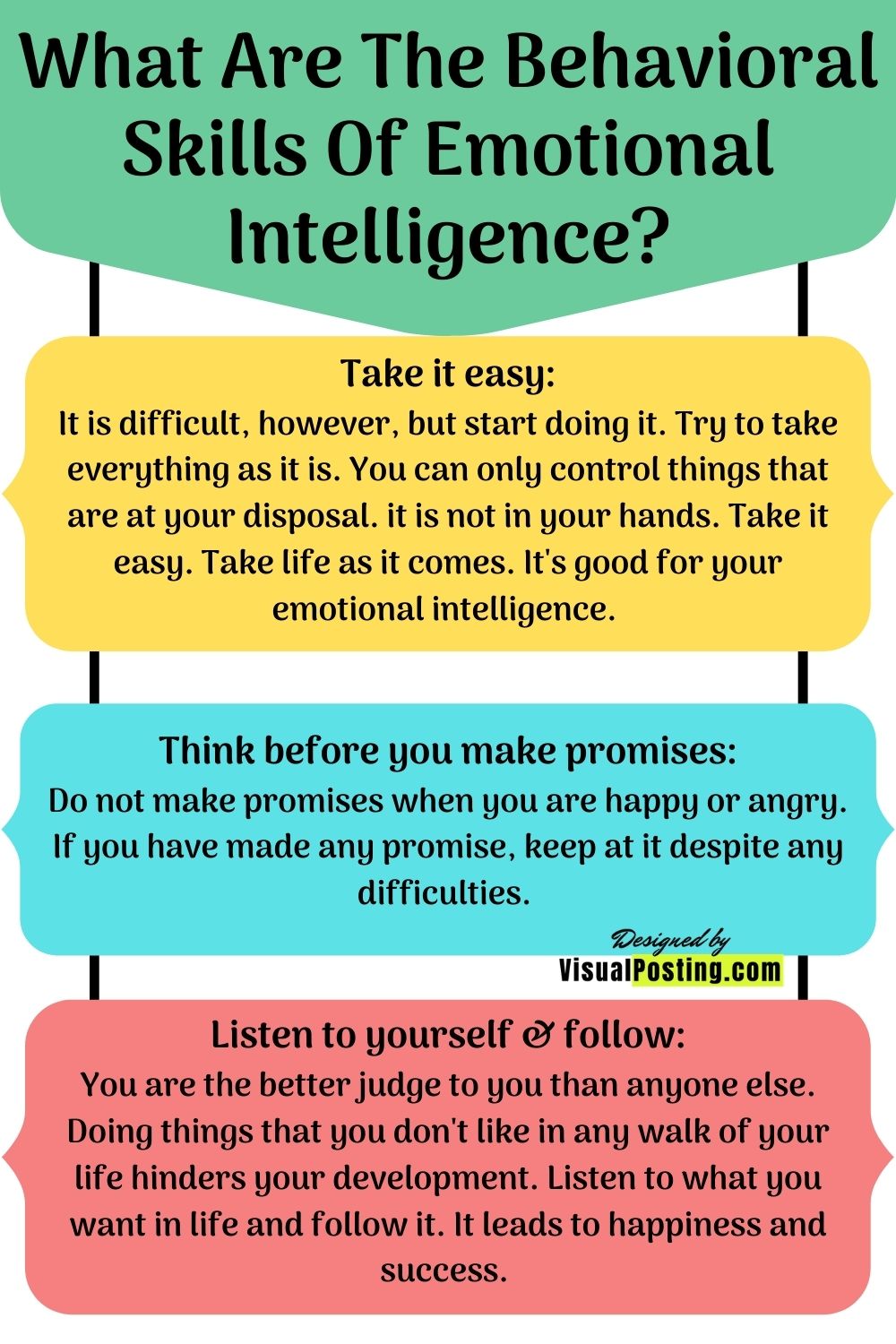
Take it easy:
It is difficult, however, but start doing it. Try to take everything as it is. You can only control things that are at your disposal. It is not in your hands. Take it easy. Take life as it comes. It's good for your emotional intelligence.
Think before you make promises:
Do not make promises when you are happy or angry. If you have made any promise, keep at it despite any difficulties.
Listen to yourself & follow:
You are the better judge to you than anyone else. Doing things that you don't like in any walk of your life hinders your development. Listen to what you want in life and follow it. It leads to happiness and success.
Handling emotions is a lifelong lesson:
Even the mature person can lose control and act out of emotions at some point. Emotional intelligence is more like a lifelong learning lesson that you perfect every day.
You are not above or below anyone:
The inferiority complex negatively brings emotional outcomes starting with anger. In the same way, superiority brings negative outcomes in the form of ego. Both are bad personality traits. Take care that you don't step into any of the above behaviors. It is important for your emotional intelligence.
Let go of the ego:
Let go of the ego. It is the key behavior that you need to improve your emotional intelligence. Ego brings no good. The ego will not bridge the gap between people. It has no positive outcomes when you show it, or someone shows it to you.
Don't hesitate to get down for a Sorry:
Be the first when it comes to saying sorry. Strong people are the ones who don't hesitate to ask sorry and give forgiveness. Bring in this good habit.
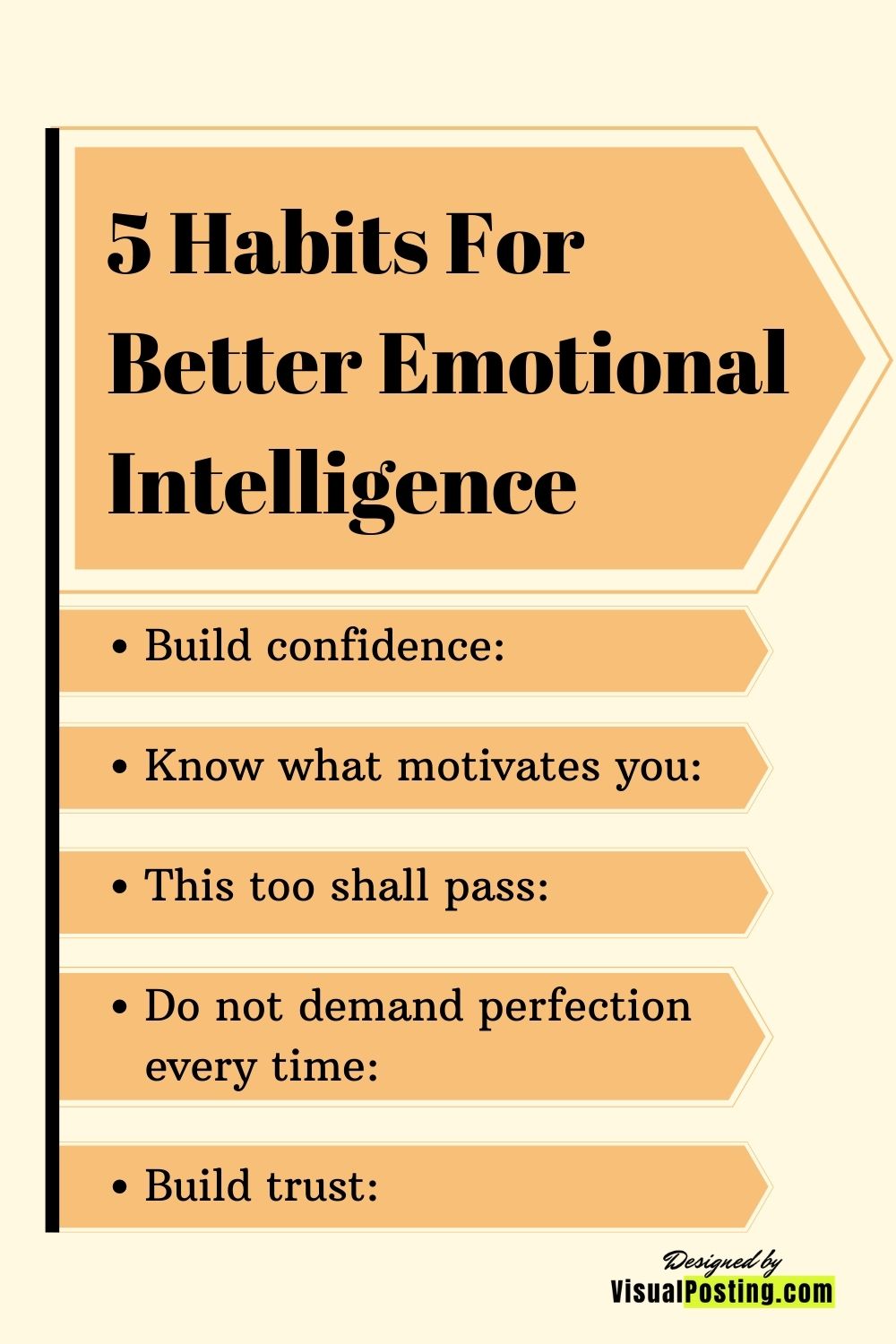
1. Build confidence:
A Confident person achieves more than those who feel insecure. Trust yourself that what you are doing is right and you can do it. Confidence comes automatically to you. Make sure to put a stop when the confidence you have becomes an over-confidence trait.
2. Know what motivates you:
Look into factors that motivate you. People often find things they do unrewarding or unproductive due to a lack of motivation and interest. Take care of it. Identify things that motivate you and keep at it.
3. This too, shall pass:
Nothing is permanent. People ad emotions change over time. Difficult times can nurture forgiveness and compassion. Remind yourself that 'this too shall pass.' This is a key behavior to improve your emotional intelligence during tough times in life.
4. Do not demand perfection every time:
Perfection has its beauty but not always. You cannot expect people to be perfect or reciprocate your level of perfection. Accept people, friends, and families around you for who they are. Perfection in work can sometimes make you stressed and lose focus. Give your best in the things you do. Don't make it a stressful process. Perfection is a balance. Keep it that way. Demanding perfection every time can break the balance.
5. Build trust:
Nothing works without trust. Build it with people around you professionally and personally. Trust can sometimes go wrong. By that time, it will be the hardest life lesson for you. It is also good. In the end, everything around us is built on trust, so work on it.
"The road to success and the road to failure are almost exactly the same." -- Colin R. Davis
1. Celebrate your life:
It's one life. Celebrate success. Celebrate your failures too as you get to learn a life lesson that nobody could have taught you. Take time to enjoy your life's blessings.
2. Be grateful:
If you need to grow, think of people above you. If you need to be happy, look down to people who don't have what you have. Be grateful to things that life gave you. Work hard for your success. Being grateful is also a form of behavior that help improve your emotional wellbeing and intelligence.
3. Practice gratitude journaling:
Gratitude journaling is to put things in perspective for you. It is to make you see how blessed you are. To look at the good and not to worry about what you don't have is a good practice for self-growth. At the end of the day, fill your journals with things you are blessed and grateful for.
4. Spend time with people you love:
It can make you happy, elated and stress-free. Spending time with friends, family and loved one is always a wonderful investment that you can make with your life.
5. Travel:
Travel has changed many people's perspectives on life. Traveling is good and if you could then don't hesitate to take the trip. Even a short trip is a good mood booster.
6. It takes time:
Emotional intelligence does not come in a day. As we can see, people who have suffered in life seem to be more emotionally intelligent than those who have been happy until now. Emotional intelligence comes with experience. On the contrary, there are good behaviors that you can implement from the start to improve your emotional intelligence.
1. Mentally subtle & stable:
It can be difficult but in time you will understand the need for good mental stability and subtlety. Mental wellness is always in your hand in the end. A mentally subtle and stable person can handle any difficult situations with ease. It's a key behavior to improve your emotional intelligence.
2. Do not criticize:
Avoid criticizing or shaming fellow persons even in person or in public. It's bad behavior. On the other hand, constructive criticism is good. The irony here is some people can't handle even a constructive-criticism. It's a mixed bag. Tread carefully when it comes to criticisms.
3. Follow an easy time-management strategy in your daily life:
Time management is important. You know your life and routines better than anybody else. Follow a time-management strategy that suits your lifestyle. Managing the time that you have is beneficial in many ways.
4. Self-respect is important:
Self-respect is the best shield a person could have in the entirety. Respect to self is a key emotional intelligence that you need to succeed in your life.
5. Acceptance:
Good things, bad things, and unexpected things are all part of life. Things going off your plans are common. Acceptance is key. It is a form of emotional intelligence. Accepting can help you stable the emotional overwhelming. It shows the next step.
6. Nurture positivity:
Positivity should be a way of life. It is not a strategy that we should follow or try to implement. It is something that comes from within. Starting your day by folding your bed, grateful that you are well, cleaning the room is a simple form of positivity that you can follow as a way of life. Make positivity your way of life.
1. Do not succumb to peer pressure:
You are unique. Do not let others decide yourself. Do not let people and situations to alter your good self. Do not succumb to your Peer Pressure. Think about what is right and do it. do not allow other people to cloud your judgments. Always do what is right. Be yourself. It matters.
2. Enjoy what you do:
Enjoy what you do else every day and every minute will seem like an eternity to you. Understand that, doing things that you don't enjoy or like will not help you in the long run.
3. Have time to do things you like:
Take the time to do things you like. It can be your hobby, arts, music, books, taking short vacations, long car rides, hanging out with friends, etc. the list goes on. Doing things that you like boosts your emotional wellness higher.
4. Good food equals good life:
Good food takes care of your health. When it comes to unhealthy processed foods, it changes the entire way the body functions. Unhealthy fats, beverages, and sugars will block your body function to a great extent. Maintain a proper healthy meal plan. Eating as when needed should be avoided.
5. Physically active:
Being active physically has a direct connection with your mental wellness. An early morning walk, or breathing exercise or simple stretching are a few examples that we can consider taking. Spend at least 30 minutes each day to keep yourself physically active. It improves your healthy hormones which in turn leads to better health.
1. Maintain a healthy friends circle:
Good Friends are one of the biggest joys of life. Do not let them go. Maintain a healthy close friend circle for life.
2. Stop pointing mistakes:
People make mistakes including you. It is common. Emotional intelligence here is to stop pointing other people's mistakes blatantly. If it has to be done, do it personally. Furthermore, stop blaming and pointing people if things didn't go according to your plan.
3. Do not dwell on the past:
It is a waste of time whereas learning from the past is important here. Dwelling on the past is not good for your emotional wellbeing. It stops you from taking a step forward in your life.
4. Never hold on to anger and hate:
Letting things go is one of the best behaviors that help improve your emotional intelligence. Let go of anger and hate. It destroys your well-being. It takes away your peace and happiness. Always remember, Anger and hate are self-punishments.
5. Learn from mistakes:
We all do mistakes knowingly or unknowingly. In spite of it, accepting that you have made a mistake and learning from it is a wonderful personality.
6. Guilt or Regret is no good:
Holding on to guilt is never good. Instead, do something about it or see what things you can change to bring positivity. The same goes to regret. Regretting things in life happens to everyone. But, if it keeps happening often then it is time to self-analyze. See where things are going wrong and correct. Guilt and regret should be cleared and not be held on.
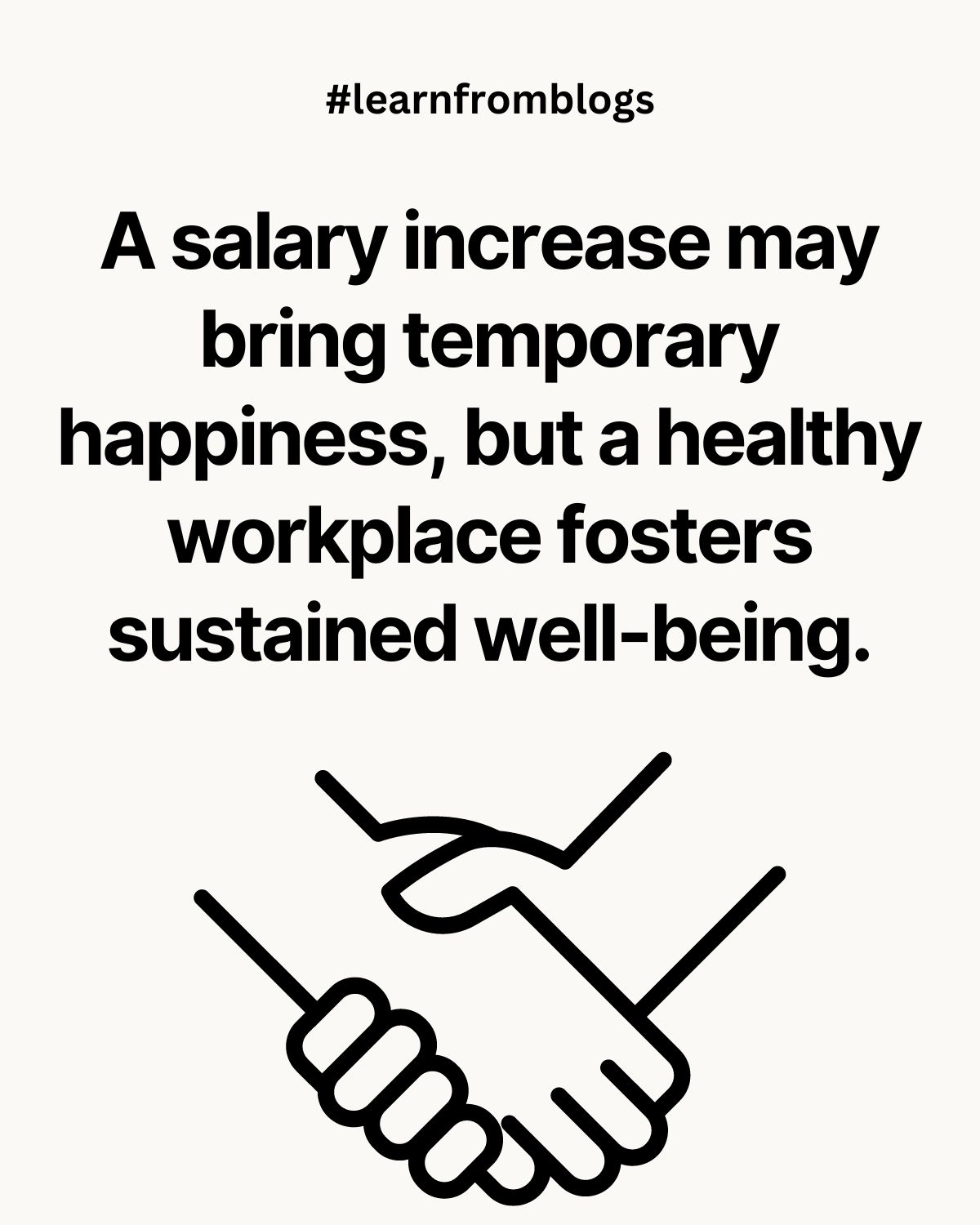
1. Be mindful:
Be mindful of everyone and everything around you. Starting from the food you eat be mindful and choose healthy options. Be mindful of other people and respect their feelings. Be mindful in choosing how you present yourself emotionally to people around you.
2. Don't bottle yourself:
Bottling up your problems and feelings does no good. Share it with someone close like a best friend or family member. Do not bottle yourself as it leads to a stressful mental state. It blocks your emotional wellness.
3. Give Credit to fellow people:
In other words, appreciate people. Support them through appreciating their efforts and giving credit for what they have done. It not only applies to your professional life but also in every walk of life.
4. Be a good listener:
Listen when people come to you to speak. Hear what they have to say. It brings trust to you. Regardless of offering a solution, just be a good listener. Being a good listener means you are acknowledging other people's thoughts and feelings. It's an important behavior for good emotional intelligence.
5. Develop good social skills:
We are always surrounded by people in every stage of our life. Socializing is important. Do not hesitate to make friends. Be the first to start conversations. Lend your help when needed. Be warm. Being Loyal, honest, being friendly and reliable are few essential social skills you need to build good emotional intelligence.
6. Convey positively:
Your thoughts, feelings, ideas and other emotions should be conveyed positively. Do not act out and expect other people to understand it. Redirect your emotional outcomes positively towards others instead of acting out. Even if it's a big mistake, try to take things positively with the person who did it. Conveying things positively has a tremendous impact.
1. Be the conflict resolver:
Wherever you are and whatever situation you are in, always be the conflict resolver. Don't be the person who creates a problem or escalate an existing problem. A foremost behavior that helps improve your emotional intelligence is this. Be the problem solver. Do what you can.
2. Take responsibility for your actions:
It is an important behavior. Be responsible enough to admit your bad actions or behaviors. Take responsibility for it. By doing so, you are acknowledging that you have something that needs to be changed. This awareness will help you become a better person.
3. Be approachable:
Friends, families, and colleagues should get a feeling that they can approach you any time anywhere. Do not be an approachable person only when you are happy. Do not be a grumpy person when you are not happy. Being stable and approachable in times of your good and bad days is an important emotional intelligence behavior.
4. Be available to others:
Do not wait for an invitation here. Be available to people in bad times as well as good times. Be available to others. Be there and support people.
5. Control your emotional outcomes:
To lose control of your emotions is to lose yourself. An emotional outcome in a good way is acceptable. When it comes to bad emotional outcomes, it is a big problem creator. Always be in control of your emotions. Be stable enough to not let anything control your emotions other than yourself. Emotional intelligence in this situation is to think before you act out of emotion.
Remember that emotional intelligence is not something that you develop in a day or month. It takes time and patience. Most importantly, one should have the will power towards self-improvement. Emotional intelligence makes sense if and only if the individual is ready to bring in goodness, improvement, and respect to themselves and the others.
Keeping in mind how beneficial emotional intelligence is for your self-building, let's see some of its associated behaviors.
50 Behaviors that Help improve Emotional Intelligence
- Be the conflict resolver:
- Take responsibility for your actions:
- Be approachable:
- Be available to others:
- Control your emotional outcomes:
- Be mindful:
- Don't bottle yourself:
- Give Credit to fellow people:
- Be a good listener:
- Develop good social skills:
- Convey positively:
- Maintain a healthy friends circle:
- Stop pointing mistakes:
- Do not dwell on the past:
- Never hold on to anger and hate:
- Learn from mistakes:
- Guilt or Regret is no good:
- Do not succumb to peer pressure:
- Enjoy what you do:
- Have time to do things you like:
- Good food equals good life:
- Physically active:
- Mentally subtle & stable:
- Do not criticize:
- Follow an easy time-management strategy in your daily life:
- Self-respect is important:
- Acceptance:
- Nurture positivity:
- Celebrate your life:
- Be grateful:
- Practice gratitude journaling:
- Spend time with people you love:
- Travel:
- It takes time:
- Build confidence:
- Know what motivates you:
- This too, shall pass:
- Do not demand perfection every time:
- Build trust:
- Take it easy:
- Think before you make promises:
- Listen to yourself & follow:
- Handling emotions is a lifelong lesson:
- You are not above or below anyone:
- Let go of the ego:
- Don't hesitate to get down for a Sorry:
- Set goals and work for it:
- Follow your passion:
- Live life to your best:
- Good Times and Bad Times are part of life:




